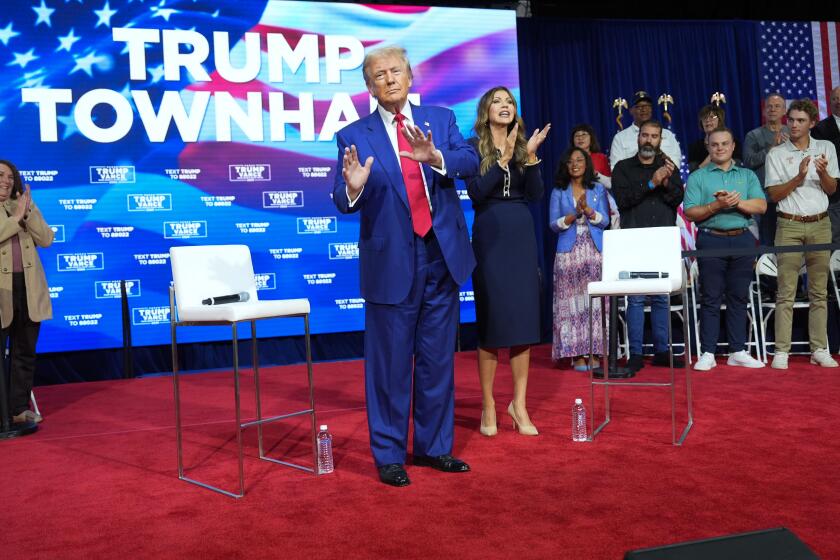Clinton Rebuts Charges of Indecisiveness, Drift : Strategy: He heatedly defends himself, dismissing recent poll numbers and creating the image of a hard-fighting crusader.
President Clinton shrugged off poor poll numbers and heatedly defended himself Friday against charges of indecisiveness and drift, saying the American people “do not expect miracles, but they expect solid, steady progress” and they have gotten that from his Administration.
“Who else around this town in the last dozen years has offered this much budget-cutting, this much tax increase, this much deficit reduction and a clear economic strategy. . . . ?” Clinton said.
Clinton’s sometimes pugnacious, sometimes defensive Rose Garden press conference reflected a new White House strategy, begun last week, of aggressively touting the President’s successes while forcefully rebutting critics in the press, in Congress and elsewhere, who have accused him of accomplishing little in his first months in office.
As he has all week, Clinton assumed the posture of the hard-fighting crusader, battling Washington special interests and a political culture of “cynicism”--an image he cultivated during his presidential campaign.
“I’m fighting to change things,” he said, “the American people know one thing, that I’m on their side.”
Asked about recent polls that have shown support for him flagging, Clinton insisted he was not worried. “If I worried about the poll ratings, I’d never get anything done here,” he said.
“I’m trying to do hard things and I cannot do hard things and conduct an ongoing campaign at the same time,” he added. In fact, part of the new White House strategy has been to campaign more actively, traveling each week to a different part of the country to sell the basic economic program. And both Clinton and his political advisers believe that new plan has begun to work. “It has been a good week,” Clinton said.
But as he answered questions that focused repeatedly on the continuing war in Bosnia and on his own character, Clinton conceded that he may face more tough weeks ahead.
“I’m doing things that are hard, that are controversial. And anybody who doesn’t want to assume responsibility can stand on the sidelines and criticize,” he said.
The President appeared relaxed and at ease, despite questions that suggested he was “waffling” or “indecisive and perhaps not tough enough” in carrying out his duties.
Perhaps in an attempt to rebut such images, he asserted far firmer control over the proceedings than he has at earlier press conferences, making senior television correspondents, who have grown used to asking questions at the beginning of press conferences, wait until later, and tersely shutting off questions he did not wish to answer, particularly on the subject of gays in the military.
“You know what my position is. I have nothing else to say about it,” he said in response to one question on that subject. “I support the present code of conduct, and I am waiting for the Pentagon to give me its recommendations,” he said in brushing off a second attempt.
For weeks, Clinton and his advisers have complained that because of the frequent questions fired at him on the subject from the press, the public believes he has spent far more time on the gay issue than he actually has. Since his inauguration, Clinton asserted, the gay issue has assumed only 2 1/2 hours of his office time and he has been determined to reduce the issue’s high profile.
Instead, Clinton has sought to focus attention on the economy and his budget package, which has begun to clear initial congressional hurdles. Officials are also hopeful of winning passage of a deeply scaled-down version of the economic stimulus package killed earlier this spring by a Republican filibuster.
Leon E. Panetta, director of the Office of Management and Budget, said Clinton would ask Congress to pass a $900-million program that would provide funds for summer jobs for students, for waste-water treatment plants and for police hiring. Cuts in existing programs would pay for the new spending, he said.
Senate Minority Leader Bob Dole (R-Kan.) already has endorsed the outlines of the plan, making its passage more likely.
But in an interview after Clinton’s press conference, Dole was less than complimentary in his overall evaluation of the President.
“There is a feeling around, even among those of us who support him, that he can’t make a decision,” Dole said, ostensibly referring to Clinton’s Bosnia policy but using language that critics have employed repeatedly to indict his overall performance.
Clinton sought to rebut the view, insisting that “we’re not vacillating.” Acknowledging he has insisted on broad consultation before making a final decision on issues like Bosnia, he said: “I do not believe that is a sign of weakness.”
Fielding questions on a broad range of domestic policy topics, Clinton said he saw “no reason at this time to believe that there could be any cause for resurgent inflation,” despite this week’s report that inflation in April ran at the unexpectedly high rate of 0.4% for the month, or roughly 4.3% annually. That report had led to a sharp drop in the stock market and fears that the Federal Reserve might push up interest rates.
Clinton noted that the monthly inflation rate has bounced around considerably, having been only 0.1% in March. “You can’t run the country on a month-by-month basis,” he said, “you’ve got to look at some longer trends.”
“You can find an expert to argue any opinion,” he said, but the “prevailing opinion in the economic community has been that the most important thing we can do is to bring down long-term interest rates by bringing down the deficit.”
The President also defended his nomination of Lani Guinier as head of the Justice Department’s civil rights division and Webb Hubbell as associate attorney general, the department’s No. 3 post.
Hubbell has been under fire for belonging to a country club in Little Rock, Ark., that had no black members until recently and now has only one. Hubbell had “tried for years to integrate” the club over opposition from some of its members, Clinton said, noting that “I know that because I used to hit on him about it.”
The issue is a refrain of one that arose during his campaign, when he apologized for having played golf there shortly after winning a key primary. Hubbell “has always had a reputation as being a strong advocate of civil rights,” Clinton said.
Opposition to Guinier has centered on accusations that her advocacy of civil rights has been too strong. Several conservative groups have attacked Guinier’s writings, saying they amount to a call for racial quotas. Clinton defended her, saying he had chosen her “because there had never been a full-time practicing civil rights lawyer with a career in civil rights law, heading the civil rights division.”
But Clinton pointedly noted that “policy . . . on civil rights laws” would be set by Congress and “insofar as there is discretion in the policy” it would be determined by “the President or the attorney general.”
Times staff writer James Gerstenzang contributed to this story.
More to Read
Get the L.A. Times Politics newsletter
Deeply reported insights into legislation, politics and policy from Sacramento, Washington and beyond. In your inbox three times per week.
You may occasionally receive promotional content from the Los Angeles Times.











